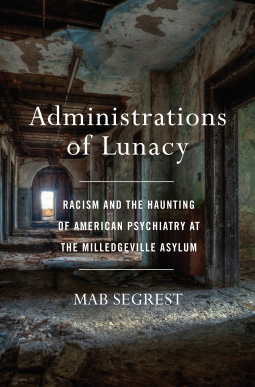
Administrations of Lunacy
Racism and the Haunting of American Psychiatry at the Milledgeville Asylum
by Mab Segrest
This title was previously available on NetGalley and is now archived.
Send NetGalley books directly to your Kindle or Kindle app
1
To read on a Kindle or Kindle app, please add kindle@netgalley.com as an approved email address to receive files in your Amazon account. Click here for step-by-step instructions.
2
Also find your Kindle email address within your Amazon account, and enter it here.
Pub Date Apr 14 2020 | Archive Date Apr 19 2020
Talking about this book? Use #AdministrationsofLunacy #NetGalley. More hashtag tips!
Description
Today, 90 percent of psychiatric beds are located in jails and prisons across the United States, institutions that confine disproportionate numbers of African Americans. After more than a decade of research, the celebrated scholar and activist Mab Segrest locates the deep historical roots of this startling fact, turning her sights on a long-forgotten cauldron of racial ideology: the state mental asylum system in which psychiatry was born and whose influences extend into our troubled present.
In December 1841, the Georgia State Lunatic, Idiot, and Epileptic Asylum was founded. A hundred years later, it had become the largest insane asylum in the world with over ten thousand patients. Administrations of Lunacy tells the story of this iconic and infamous southern institution, a history that was all but erased from popular memory and within the psychiatric profession.
Through riveting accounts of historical characters, Segrest reveals how modern psychiatric practice was forged in the traumas of slavery, the Civil War, Reconstruction, and Jim Crow. Deftly connecting this history to the modern era, Segrest then shows how a single asylum helped set the stage for the eugenics theories of the twentieth century and the persistent racial ideologies of our own times. She also traces the connections to today's dissident psychiatric practices that offer sanity and create justice.
A landmark of scholarship, Administrations of Lunacy restores a vital thread between past and present, revealing the tangled racial roots of psychiatry in America.
Available Editions
| EDITION | Other Format |
| ISBN | 9781620972977 |
| PRICE | $28.99 (USD) |
| PAGES | 384 |
Featured Reviews
 B. M, Reviewer
B. M, Reviewer
As a psychology major this book held my interest. So much of what was discussed in this book had never made it to our classes, which is a good thing. I wanted to learn new things, and this book pretty much gives you really interesting facts and and little bits of knowledge. A must-read for psych and non-psych readers!
 Reviewer 602942
Reviewer 602942
Mab Segrest, a feminist and anti-racist author, painstakingly traces the racist origins of psychiatry in the United States through the lens of the patients and doctors who walked the corridors of Milledgeville Asylum in Georgia. These origins begin with the purchase of the land on which the Milledgeville asylum was built in 1841 -- lands that were stolen from native American. In subsequent years, those who practiced in the field of psychiatry would develop pseudo-medical theories that helped consolidate the racism that Georgia and other states in this country would use to justify segregation and white violence against African Americans. For example, lower rates of insanity among African Americans were attributed to the "healthy restraints" of slavery. Unlike white Americans, the "negro brain" was not bothered by the stresses of modern life. Thus "freedom" in the minds of Southern psychiatrists became a "disease factor." Such racist explanations of mental illness did not disappear with the onset of the twentieth century, rather they took new forms, as physicians became to place less emphasis on trauma and more emphasis on heredity as cause for mental disorders. These new theories would provide the justification for the sterilization of those with mental disorders -- a policy that disproportionately affected women and persons of color. For example in North Carolina of the 7797 sterilizations that took place between the 1930s and 1970s, 5000 of them were of African American women. Sadly, as the author shows racism and misogyny continue to inform policies of incarceration at both mental institutions and prisons. In short, the author has provided a thought-provoking history of the entangled relationship between psychiatry, racism, and misogyny. I only wish that in the early pages of this volume that the author had refrained from making quite so many speculative remarks about the feelings and thoughts of the asylum's early occupants. These speculations, at least for me, added little to what was otherwise a powerful and informative history of psychiatry's dark side.
Administrations of Lunacy is an eye-opening book on the racism in psychiatry. The author does the research to inform readers of an asylum in Georgia. She details reports and facts from her findings to show how racism shaped the world of psychiatry.
Mab begins the book and starts with details about the Milledgeville Asylum. There are many facts presented that show the conditions that patients, in particular, African Americans were put through. It is heartbreaking to know how poorly they were treated because of their race. She even shows how it impacted future theories like eugenics.
I learned a lot from this book. I really appreciated the detail and findings because the author was able to back up statements and opinions.
I give Administrations of Lunacy 4 stars. This book is a history lesson that needs to be talked about more. If you have ever wanted to know more about the world of psychiatry and the origin of some of its beliefs, then you will want to read this one.
Readers who liked this book also liked:
Jodi Picoult; Jennifer Finney Boylan
General Fiction (Adult), Literary Fiction, Women's Fiction
Jennifer Chiaverini
General Fiction (Adult), Parenting & Families, Women's Fiction


















